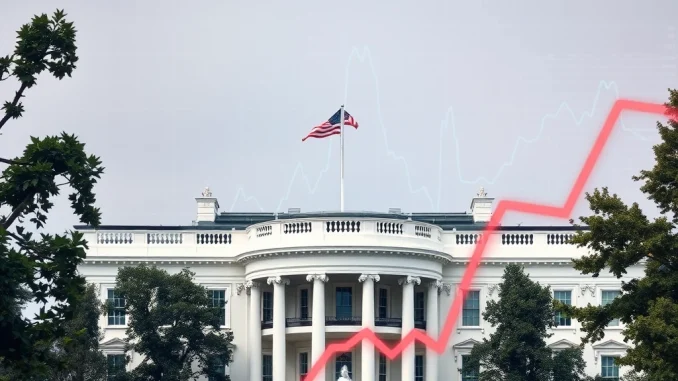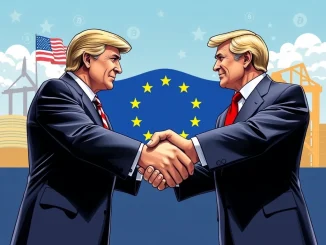
Even in the fast-paced world of cryptocurrency, understanding broader economic and political signals is crucial. News originating from the White House, particularly concerning significant policy matters like a potential trade agreement, can send ripples through global markets. While not directly about Bitcoin or altcoins, these macro events can influence investor sentiment and capital flows, indirectly impacting the crypto landscape.
Examining White House Insights on a Trade Agreement
Let’s look back at a specific instance highlighting this connection. According to reports from Jin10, Kevin Hassett, who served as the Director of the National Economic Council (NEC) during a period of significant trade discussions, indicated an expectation for a trade agreement to be reached within a short timeframe – specifically, 1-2 weeks. This statement, while brief, carried weight due to its source within the administration responsible for shaping economic policy.
The National Economic Council (NEC) plays a vital role in coordinating economic policy across the executive branch of the U.S. government. The Director of the NEC is a key advisor to the President on economic matters. Therefore, comments from individuals like Kevin Hassett regarding trade negotiations were closely watched by analysts and investors alike, seeking clues about future policy direction and its potential economic consequences.
Why Does a Trade Agreement Matter for Global Markets?
Trade agreements are fundamental to international commerce. They establish rules, reduce barriers like tariffs and quotas, and aim to facilitate smoother exchanges of goods and services between countries. The expectation or realization of a significant trade agreement can have several far-reaching effects:
- Impact on Industries: Specific sectors like manufacturing, agriculture, and technology can be directly affected by changes in trade rules, influencing their profitability and growth prospects.
- Supply Chain Stability: Predictable trade relationships help businesses plan and secure their supply chains, reducing uncertainty.
- Inflation and Consumer Prices: Tariffs or lack thereof can influence the cost of imported goods, impacting inflation rates.
- Investor Confidence: Clarity and stability in trade relations generally boost business and investor confidence, encouraging investment. Conversely, trade tensions create uncertainty and can deter investment.
Historically, periods of trade friction, such as those between the U.S. and major trading partners, have introduced significant volatility into global markets. Announcements or expectations regarding progress (or lack thereof) on a trade agreement have often triggered notable market movements in traditional assets like stocks, bonds, and currencies.
How Do Global Markets Influence Cryptocurrency?
While often discussed as a separate asset class, cryptocurrency markets do not exist in a vacuum. They are increasingly intertwined with broader macro-economic trends and traditional financial markets. Here’s how shifts in global markets, potentially driven by news from the White House about a trade agreement, can relate to crypto:
Historically, during times of heightened economic uncertainty or market stress (often exacerbated by geopolitical issues like trade disputes), investors have sometimes moved towards perceived safe-haven assets. While Bitcoin was initially theorized as a potential safe haven, its price action has, at times, shown correlation with risk-on assets like technology stocks, particularly as institutional adoption has grown.
Consider these points:
- Sentiment Spillover: Positive news (like an expected trade deal) can foster a risk-on environment, potentially increasing investor appetite for volatile assets, including cryptocurrencies. Negative news can have the opposite effect.
- Liquidity: Major shifts in traditional markets can impact overall market liquidity. If large investors are repositioning based on macro news, this can affect capital availability for other markets, including crypto.
- Institutional Investment: A significant portion of recent crypto market growth has been driven by institutional investors. These entities are highly sensitive to macro-economic conditions and policy announcements from sources like the White House and the National Economic Council. Their investment decisions are often influenced by the broader economic outlook shaped by factors like trade relations.
- Currency Strength: Trade agreements can impact currency valuations. While not a direct link, changes in major fiat currency strengths can sometimes have indirect effects on crypto markets, particularly stablecoins and trading pairs.
Therefore, while a statement from Kevin Hassett about a trade agreement isn’t a direct crypto price prediction, it’s a piece of the larger economic puzzle that investors in digital assets should monitor. It speaks to the potential for shifts in global markets that can create tailwinds or headwinds for crypto.
Navigating Uncertainty: Actionable Insights for Crypto Investors
Given the potential, albeit indirect, influence of macro news like White House statements on trade, how can crypto investors use this information?
- Stay Informed: Pay attention to major economic news outlets covering policy decisions from the White House and comments from key figures like those at the National Economic Council. Understand the potential implications for global markets.
- Recognize Correlations (and Divergences): Observe how the crypto market reacts to significant movements in traditional markets driven by macro news. While correlations can change, understanding historical relationships can be insightful.
- Integrate Macro into Your Strategy: Don’t make impulsive trades based on a single news headline. Instead, integrate your understanding of macro-economic trends and potential shifts in global markets into your overall investment thesis and risk management plan.
- Risk Management: Be aware that periods of macro-economic uncertainty can increase volatility across asset classes, including crypto. Ensure your portfolio is diversified and your risk exposure is appropriate for your investment goals.
Compelling Summary: Macro Matters for Crypto
News originating from the White House regarding a potential trade agreement, such as the expectation voiced by former National Economic Council Director Kevin Hassett, serves as a reminder that the cryptocurrency market is increasingly connected to the broader financial ecosystem. While seemingly distant, these policy decisions can significantly impact global markets by influencing economic sentiment, investor confidence, and capital flows. For crypto investors, staying informed about these macro-economic signals is not just about understanding traditional finance; it’s about gaining a more complete picture of the forces that can shape volatility and opportunity in the digital asset space. Monitoring such developments allows for a more informed approach to navigating the complexities of today’s interconnected financial world.



